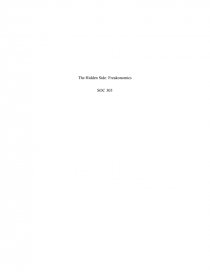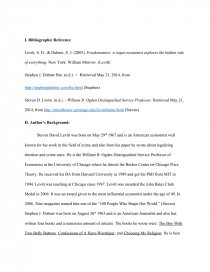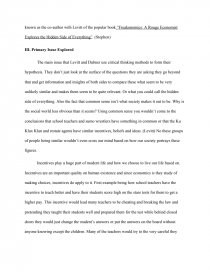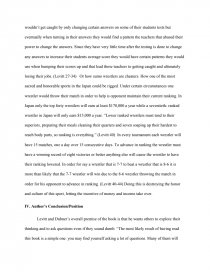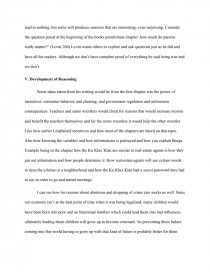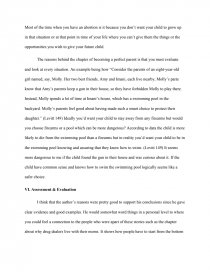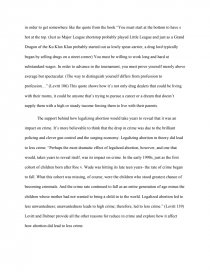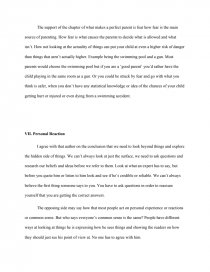The Hidden Side: Freakonomics
Essay by padthaicksh • October 28, 2018 • Essay • 2,352 Words (10 Pages) • 1,016 Views
The Hidden Side: Freakonomics
SOC 305
I. Bibliographic Reference
Levitt, S. D., & Dubner, S. J. (2005). Freakonomics: a rogue economist explores the hidden side of everything. New York: William Morrow. (Levitt)
Stephen J, Dubner Bio. (n.d.). >. Retrieved May 21, 2014, from
http://stephenjdubner.com/bio.html (Stephen)
Steven D. Levitt. (n.d.). - William B. Ogden Distinguished Service Professor. Retrieved May 21, 2014, from http://pricetheory.uchicago.edu/levitt/home.html (Steven)
II. Author’s Background:
Steven David Levitt was born on May 29th 1967 and is an American economist well known for his work in the field of crime and also from his paper he wrote about legalizing abortion and crime rates. He is the William B. Ogden Distinguished Service Professor of Economics at the University of Chicago where he directs the Becker Center on Chicago Price Theory. He received his BA from Harvard University in 1989 and got his PhD from MIT in 1994. Levitt was teaching at Chicago since 1997. Levitt was awarded the John Bates Clark Medal in 2004. It was an award given to the most influential economist under the age of 40. In 2006, Time magazine named him one of the “100 People Who Shape Our World.” (Steven) Stephen J. Dubner was born on August 26th 1963 and is an American Journalist and also has written four books and a numerous amount of articles. The books he wrote were: The Boy With Two Belly Buttons, Confessions of A Hero-Worshiper, and Choosing My Religion. He is best known as the co-author with Levitt of the popular book “Freakonomics: A Rouge Economist Explores the Hidden Side of Everything”. (Stephen)
III. Primary Issue Explored
The main issue that Levitt and Dubner use critical thinking methods to form their hypothesis. They don’t just look at the surface of the questions they are asking they go beyond that and get information and insights of both sides to compare these what seem to be very unlikely similar and makes them seem to be quite relevant. Or what you could call the hidden side of everything. Also the fact that common sense isn’t what society makes it out to be. Why is the social world less obvious than it seems? Using common sense you wouldn’t come to the conclusions that school teachers and sumo wrestlers have something in common or that the Ku Klux Klan and restate agents have similar incentives, beliefs and ideas. (Levitt) No these groups of people being similar wouldn’t even cross our mind based on how our society portrays these figures.
Incentives play a huge part of modern life and how we choose to live our life based on. Incentives are an important quality on human existence and since economics is they study of making choices, incentives do apply to it. First example being how school teachers have the incentive to teach better and have their students score high on the stare tests for them to get a higher pay. This incentive would lead many teachers to be cheating and breaking the law and pretending they taught their students well and prepared them for the test while behind closed doors they would just change the student’s answers or put the answers on the board without anyone knowing except the children. Many of the teachers would try to the very careful they wouldn’t get caught by only changing certain answers on some of their students tests but eventually when turning in their answers they would find a pattern the teachers that abused their power to change the answers. Since they have very little time after the testing is done to change any answers to increase their students average score they would have certain patterns they would use when bumping their scores up and that lead those teachers to getting caught and ultimately losing their jobs. (Levitt 27-34) Or how sumo wrestlers are cheaters. How one of the most sacred and honorable sports in the Japan could be rigged. Under certain circumstances one wrestler would throw their match in order to help is opponent maintain their current ranking. In Japan only the top forty wrestlers will earn at least $170,000 a year while a seventieth- ranked wrestler in Japan will only earn $15,000 a year. “Lower ranked wrestlers must tend to their superiors, preparing their meals cleaning their quarters and seven soaping up their hardest to reach body parts, so ranking is everything.” (Levitt 40) In every tournament each wrestler will have 15 matches, one a day over 15 consecutive days. To advance in ranking the wrestler must have a winning record of eight victories or better anything else will cause the wrestler to have their ranking lowered. In order for say a wrestler that is 7-7 to beat a wrestler that is 8-6 it is more than likely that the 7-7 wrestler will win due to the 8-6 wrestler throwing the match in order for his opponent to advance in ranking. (Levitt 40-44) Doing this is destroying the honor and culture of this sport, letting the incentive of money and income take over.
IV. Author’s Conclusion/Position
Levitt and Dubner’s overall premise of the book is that he wants others to explore their thinking and to ask questions even if they sound dumb. “The most likely result of having read this book is a simple one: you may find yourself asking a lot of questions. Many of them will lead to nothing, but some will produces answers that are interesting, even surprising. Consider the question posed at the beginning of the books penultimate chapter: how much do parents really matter?” (Levitt 206) Levitt wants others to explore and ask questions just as he did and have all his readers. Although we don’t have complete proof of everything he said being true and we don’t.
V. Development of Reasoning
Some ideas taken from his writing would be from the first chapter was the power of incentives, consumer behavior and cheating, and government regulation and unforeseen consequences. Teachers and sumo wrestlers would cheat for reasons that would increase income and benefit the teachers themselves and for the sumo wrestlers it would help the other wrestler. Like how earlier I explained incentives and how most of the chapters are based on that topic. Also how knowing the variables and how informations is portrayed and how you explain things. Example being in the chapter how the Ku Klux Klan are similar to real-estate agents is how they put out information and how people determine it. How real-estate agents will use certain words to describe a home or a neighborhood and how the Ku Klux Klan had a secret password they had to use in order to go and attend meetings.
...
...
